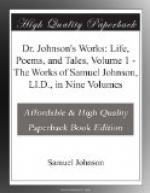the melancholy of the heart, and the melancholy of
the mind: while the latter is sceptical, sour,
and misanthropic, the former is passionate, tender,
and religious. Those who are under the influence
of the one, become inactive, morose, or heedless:
detecting the follies of the wisest and the frailties
of the best, they scoff at the very name of virtue;
they spurn, as visionary and weak, every attempt to
meliorate man’s condition, and from their conviction
of the earthward tendency of his mind, they bound his
destinies by this narrow world and its concerns.
But those whose hearts are penetrated with a feeling
for human infirmity and sorrow, are benevolent and
active; considering man, as the victim of sin, and
woe, and death, for a cause which reason cannot unfold,
but which religion promises to terminate, they sooth
the short-lived disappointments of life, by pointing
to a loftier and more lasting state. Candide
is the book of the one party, Rasselas of the other.
They appeared nearly together; they exhibit the same
picture of change, and misery, and crime. But
the one demoralized a continent, and gave birth to
lust, and rapine, and bloodshed; the other has blessed
many a heart, and gladdened the vale of sorrow, with
many a rill of pure and living water. Voltaire
may be likened to the venomous toad of eastern allegory,
which extracts a deadly poison from that sunbeam which
bears health, and light, and life to all beside:
the philosopher, in Rasselas, like some holy and aged
man, who has well nigh run his course, in recounting
the toils and perils of his pilgrimage, may sadden
the young heart, and crush the fond hopes of inexperience;
but, while he wounds, he presents the antidote and
the balm, and tells, where promises will be realized,
and hopes will no more be disappointed. We have
ventured to detain our readers thus long from Rasselas
itself, because, from its similar view of life with
the sceptical school, many well-intentioned men have
apprehended, its effects might be the same. We
have, therefore, attempted briefly to distinguish
the sources whence these different writings have issued,
and, we trust, we have pointed out their remoteness
from each other. And we do not dwell on the subject,
at greater length, because Johnson’s writings,
in various parts, will require our attention on this
particular head. To be restless and weary of
the dull details and incomplete enjoyments of life,
is common to all lofty minds. Frederick of Prussia
sought, in the bosom of a cold philosophy, to chill
every generous impulse, and each warm aspiration after
immortality; but he painfully felt, how inefficient
was grandeur, or power, to fill the heart, and plaintively
exclaimed to Maupertuis, “Que notre vie est
peu de chose;” all is vanity. The philosophy
of Rasselas, however, though it pronounces on the
unsatisfactory nature of all human enjoyments, and
though its perusal may check the worldling in his
mirth, and bring down the mighty in his pride, does




